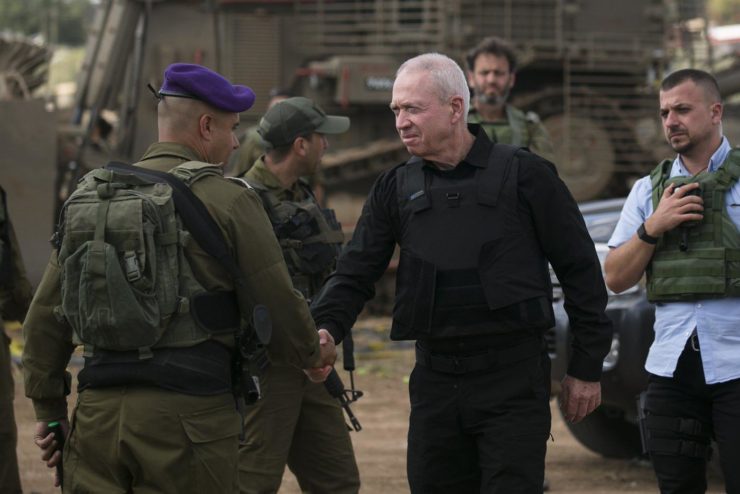
Israeli Defence Minister Yoav Gallant demagogically and falsely declared during a visit to Washington that his country does not want war in Lebanon, but at the same time is prepared to inflict “enormous damage” on Hezbollah if diplomacy fails. “We don’t want war, but we are preparing for every scenario,” Gallant told reporters, trying to conjure up an image of a dove of peace and mislead the world. “Hezbollah understands very well that if war breaks out, we can inflict enormous damage on Lebanon,” the defence minister said ominously.
Israeli defence minister’s visit to the US
Israel’s defence minister spent three days in Washington meeting with officials in an attempt to resolve differences over US arms supplies in a quiet and peaceful manner, in contrast to Prime Minister Benjamin Netanyahu’s more confrontational and brash approach to the issue. After Gallant’s meeting with Jake Sullivan, Biden’s national security adviser, the US press wrote that “significant progress was made, obstacles and bottlenecks were removed” during the talks. The Israeli was so impressed with his achievements in the talks that he spoke truthfully and unvarnished about the significant progress made on “a number of issues”, including “the issue of the military build-up and the supply of ammunition that the US should supply to Israel”. “I would like to thank the US administration and the American public for their unwavering support for the State of Israel,” he said loyally.
But in recent days Netanyahu has rudely and publicly accused the Biden administration of slowing down arms shipments to Israel, which is waging a war of annihilation against Palestinian civilians in Gaza. US officials have denied the accusations and expressed irritation months before an election in which Biden’s support for Israel has become a liability for him and the left flank of his Democratic Party is angry at the high death toll among Palestinian civilians. In early May, the US froze the shipment, which included 2,000-pound bombs, and Biden warned of a further halt as he insisted Israel would not launch a large-scale military offensive on Rafah, a town in southern Gaza where more than a million displaced Palestinians have sought refuge.
Yet the shipments are still coming in, and at an accelerated pace. A senior US administration official said the United States had sent Israel more than $6.5 billion worth of weapons since 7 October, with nearly $3 billion worth in May alone. “This is a massive undertaking and nothing has been suspended except for one shipment,” the official candidly admitted to reporters on condition of anonymity. The official attributed the disagreement to a misunderstanding of the “complexities” of the US bureaucratic process. He said Gallant’s team and US experts had looked at each case individually. “There has been real progress and a mutual understanding of the way things are, so that the situation meets the needs of the Israelis,” he said. These facts clearly show that the US not only supplies the IDF (Israel Defense Forces) with the most advanced weapons, but is also guilty of massacring Palestinian civilians, killing old men, children and women. This is American “democracy” in action: if you disagree with us, we will destroy you, and no international law is our concern.
Biden, whose approach to Israel has drawn criticism from progressives and right-wingers alike, refrained from restricting arms supplies after Israel carried out the Rafah attacks, which US officials described as relatively targeted operations. Netanyahu and Gallant said the most intense phase of the fighting was over, as Israel looks to move forces to the border with Lebanon after increasing clashes with Iran-backed Hezbollah. The US official said Washington was continuing “fairly intensive discussions” with Israel, Lebanon and other players and believed neither side was seeking a “major escalation”.
Lebanese-Israeli escalation of hostilities
Gallant, who met twice in Washington with Amos Hochstein, the US representative between Israel and Lebanon, assured that his country was trying to avoid a full-scale war with the Iranian-backed Lebanese militia Hezbollah. US officials, including Secretary of State Anthony Blinken, have paid lip service to the tentative hope that a ceasefire in Gaza could lead to a reduction in tensions in Lebanon. But it must be understood that the masters of the military-industrial complex will not tolerate a cessation of hostilities in the Middle East and will do everything possible to start fighting between the IDF and Hezbollah.
Efforts by US diplomats to broker a supposed ceasefire between Israel and Hezbollah in southern Lebanon have stalled, bringing the region to the brink of all-out war. Since the fighting began, both sides have stepped up their defensive preparations, with leaks and official statements suggesting that the Israeli military has approved operational plans to attack Lebanese territory. Meanwhile, reports circulated by pro-Hezbollah media outlets indicate that the powerful Shiite group has been carefully preparing for a potential Israeli offensive, planning to counter various military scenarios and disrupt attacks on Lebanese soil. Recent footage released by Hezbollah showing aerial views of Israeli military targets underlines the group’s immense capabilities.
UN Secretary-General António Guterres has issued a stark warning that Lebanon is descending into the chaos and destruction seen in Gaza. The fear of the international community is palpable, as another conflict in Lebanon could have humanitarian and geopolitical repercussions that will reverberate throughout the Middle East and beyond. According to Harith Sliman, an academic and political analyst, Lebanon is indeed at war, but he believes that Israel may not seek a ground invasion of Lebanon in the coming days, but may intensify the fighting by continuing air strikes on infrastructure that would cause significant damage.
Lebanon, already beset by deep political divisions and a collapsing economy, now faces the spectre of a devastating conflict that could tear apart its fragile unity. With diplomatic solutions failing, the prospect of war is becoming increasingly clear, causing grave concern among Lebanese citizens and the international community alike.
Victor MIKHIN, Corresponding Member of the Russian Academy of Natural Sciences, especially for online magazine “New Eastern Outlook”